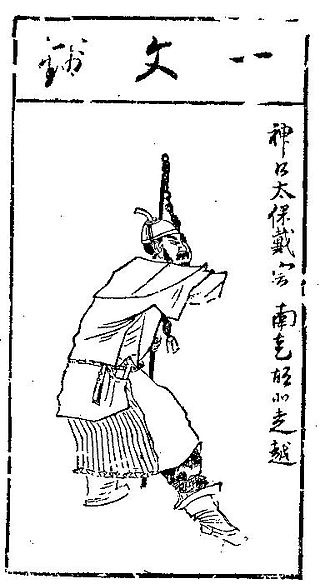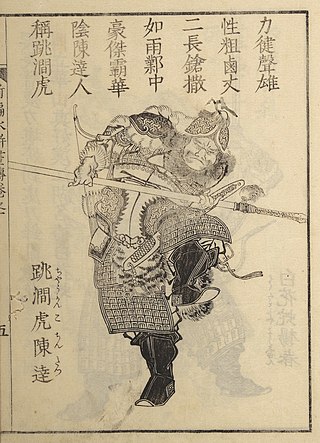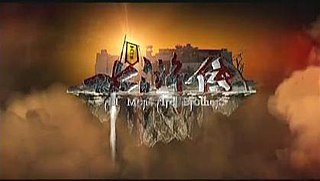
Song Jiang was a Chinese historical figure who led an armed rebellion against the ruling Song Dynasty in the early 12th century. His band marauded over a region straddling the present-day Chinese provinces of Shandong and Henan. They eventually surrendered to the Imperial Court. The historical Song Jiang was turned into a fictional character in Water Margin, which became one of the four famous Classic Chinese Novels. He is the central figure in the book, and the leader of the 108 Heroes who come together as bandits in Shandong's Liangshan Marsh.

Lu Zhishen is a fictional character in Water Margin, one of the four great classical novels in Chinese literature. He is the main character in the first segment of the novel, which spans about six chapters. Nicknamed "Flowery Monk", he ranks 13th among the 36 Heavenly Spirits, the first third of the 108 Stars of Destiny.
Lin Chong is a fictional character in Water Margin, one of the Four Great Classical Novels in Chinese literature. Nicknamed "Panther Head", he ranks sixth among the 36 Heavenly Spirits. In some folk tales derived from the novel, he is said to have learnt martial arts from Zhou Tong, who purportedly trained the Song dynasty general Yue Fei in archery.

Wu Yong is a fictional character in Water Margin, one of the Four Great Classical Novels in Chinese literature. Nicknamed "Knowledgeable Star", he ranks third among the 36 Heavenly Spirits, the first third of the 108 Stars of Destiny.

Shi Jin is a fictional character in Water Margin, one of the Four Great Classical Novels in Chinese literature. Nicknamed "Nine-Tattoo Dragon", he ranks 23rd among the 36 Heavenly Spirits, the first third of the 108 Stars of Destiny.

Zhang Qing is a fictional character in Water Margin, one of the four great classical novels in Chinese literature. Nicknamed "Featherless Arrow", he ranks 16th among the 36 Heavenly Spirits, the first third of the 108 Stars of Destiny.

Gongsun Sheng is a fictional character in Water Margin, one of the Four Great Classical Novels in Chinese literature. Nicknamed "Dragon in the Clouds", he ranks fourth among the 36 Heavenly Spirits, the first third of the 108 Stars of Destiny.

Chai Jin is a fictional character in Water Margin, one of the four great classical novels in Chinese literature. Nicknamed "Little Whirlwind", he ranks 10th among the 36 Heavenly Spirits, the first third of the 108 Stars of Destiny.

Dai Zong is a fictional character in Water Margin, one of the Four Great Classical Novels in Chinese literature. Nicknamed "Magic Traveller", he ranks 20th among the 36 Heavenly Spirits, the first third of the 108 Stars of Destiny.

Fan Rui is a fictional character in Water Margin, one of the Four Great Classical Novels in Chinese literature. Nicknamed "Demon King of Chaos", he ranks 61st among the 108 Stars of Destiny and 25th among the 72 Earthly Fiends.

Yang Chun is a fictional character in Water Margin, one of the Four Great Classical Novels in Chinese literature. He ranks 73rd among the 108 Liangshan heroes and 37th among the 72 Earthly Fiends. He is nicknamed "White Flower Serpent".

Chen Da is a fictional character in Water Margin, one of the Four Great Classical Novels of Chinese literature. Nicknamed "Stream Leaping Tiger", he ranks 72nd among the 108 Stars of Destiny and 36th among the 72 Earthly Fiends.

Yang Lin is a fictional character in Water Margin, one of the Four Great Classical Novels in Chinese literature. Nicknamed "Sleek Leopard", he ranks 51st among the 108 Stars of Destiny and 15th among the 72 Earthly Fiends.

Zhou Tong is a fictional character in Water Margin, one of the Four Great Classical Novels of Chinese literature. Nicknamed "Little Conqueror", he ranks 87th among the 108 Stars of Destiny and 51st among the 72 Earthly Fiends.

Li Zhong is a fictional character in Water Margin, one of the Four Great Classical Novels of Chinese literature. Nicknamed "Tiger Slaying General", he ranks 86th among the 108 Stars of Destiny and 50th among the 72 Earthly Fiends.

The Water Margin, also known Outlaws of the Marsh and Seven Blows Of The Dragon, is a 1972 Hong Kong film adapted from the Chinese classical 14th-century novel Water Margin. It was produced by the Shaw Brothers Studio and directed by Chang Cheh. Godfrey Ho was assistant director.

The Water Margin is a 1998 Chinese television series adapted from Shi Nai'an's classical 14th-century novel of the same title. It was produced by CCTV with Zhang Jizhong as producer. It was first broadcast in China in January 1998. The series also featured action choreography by Yuen Woo-ping.

All Men Are Brothers is a 2011 Chinese television series adapted from Shi Nai'an's 14th century novel Water Margin, one of the Four Great Classical Novels of Chinese literature. The series is directed by Kuk Kwok-leung and features cast members from mainland China, Taiwan and Hong Kong. The series was first broadcast on 8TV in March 2011 in Malaysia.

Outlaws of the Marsh is a Chinese television series adapted from Shi Nai'an's classical 14th century novel Water Margin. It was first broadcast on Shandong TV in China in 1983, and was not completed until 1986. The series was one of the earliest television dramas with an ancient China setting to be produced in mainland China. It was divided into different parts, each focusing on the story line of a certain character. Widely regarded, as a classic in mainland China, the series won a Golden Eagle Award.


















